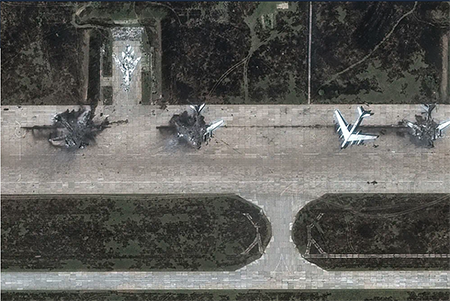"In my home there are few publications that we actually get hard copies of, but [Arms Control Today] is one and it's the only one my husband and I fight over who gets to read it first."
Russian Strategic Forces Suffer Twin Setbacks
July/August 2025
By Xiaodon Liang
Ukrainian forces destroyed an estimated 11 Russian strategic bombers as part of their defense against Moscow’s full-scale invasion of Ukraine.

The attack, carried out by drones deployed from within Russian territory, was the second blow to Russia’s strategic forces in the last month. It came days after Danish and German media outlets published details of Russian missile bunkers made public through an information security mishap.
The June 1 military operation by the Ukrainian Security Service likely destroyed about a dozen Russian aircraft, according to statements by foreign officials corroborated by imagery analysis by media outlets and open-source intelligence analysts. Although the Ukrainian forces initially claimed to have attacked 41 targets across four Russian air bases, the toll on Russian aviation is most likely limited to seven Tu-95MS strategic bombers, four Tu-22M3 intermediate-range bombers, and one An-12 cargo aircraft.
U.S. officials believe “around 10” aircraft were destroyed, Reuters reported June 4.
According to a June 2 statement and videos released on social media by the Ukrainian forces, the attack was carried out by drones deployed from mobile bases on Russian territory. The Ukrainian statement said that the operation, which had been under preparation for one and a half years, targeted the Russian air bases of Belaya, Dyagilevo, Olenya, and Ivanovo.
All of the aircraft confirmed as destroyed in the operation were based at Belaya, in the Siberian region of Irkutsk, and Olenya, in the far northern region of Murmansk.
The Tu-95MS turboprop aircraft is a Cold War-era nuclear-capable bomber that is counted under the limits of the New Strategic Arms Reduction Treaty (New START). The Tu-95MS aircraft remaining in service likely were constructed in the mid-1980s and hence relatively new airframes. Beyond the aircraft’s strategic nuclear mission, it has a secondary role as a launcher for conventional cruise missiles.
The Federation of American Scientists estimated in May that 52 Tu-95MS remain in service, but that estimate comes with “significant uncertainty.”
Although Ukrainian forces also claim to have attacked Tu-160s, the other type of Russian treaty-accountable strategic bomber, there is no evidence in satellite imagery or video footage that any were successfully destroyed.
The Ukrainian operation raises questions about the vulnerability of strategic bombers. The United States “might look at that and think, ‘Wow, what would we do if we were attacked, you know, by a country that’s doing what Ukraine did?’” Gen. David Allvin, the U.S. Air Force chief of staff, told an industry conference June 2, according to Breaking Defense.
Days earlier, German magazine Der Spiegel and Danish investigative outlet Danwatch reported on a severe information security lapse in Russia’s military procurement system.
According to Danwatch, the ministry created a new portal in 2020 for sensitive documents.
But military contractors continued to transfer documents—as significant as blueprints for intercontinental ballistic missile (ICBM) silos and bunkers—through the public portal as recently as September 2024.
The two media outlets revealed May 28 that the products of German and Danish companies were likely being purchased and used by Russia’s nuclear forces at ICBM bases. The findings were informed by close study of 2 million documents retrieved from the Russian Ministry of Defense online public tender platform, the media outlets claimed.
A foreign policy aide to Russian President Vladimir Putin, Yuri Ushakov, told TASS May 7 that Russia and the United States had discussed the topic of arms control after New START expires.
But “specific agreements to conduct negotiations specifically on this topic have not yet been reached,” he said.
